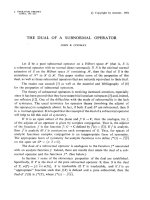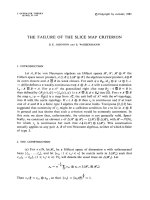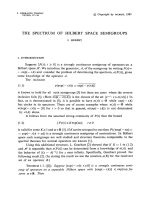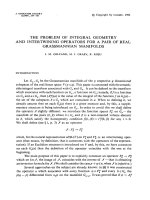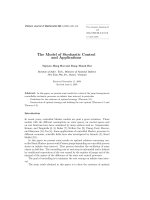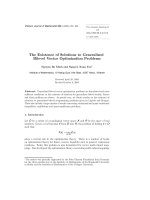Báo cáo toán học: " The Embedding of Haagerup Lop Spaces" doc
Bạn đang xem bản rút gọn của tài liệu. Xem và tải ngay bản đầy đủ của tài liệu tại đây (89.03 KB, 4 trang )
Vietnam Journal of Mathematics 34:3 (2006) 353–356
The Embedding of Haagerup L
p
Spaces
Phan Viet Thu
Faculty of Math., Mech. and Inform., Hanoi University of Science
334 Nguyen Trai, Thanh Xuan, Hanoi, Vietnam
Received April 18, 2006
Abstract. The aim of this pap er is to give a proof for a theorem due to S. Goldstein
that: If there is a
σ- weakly continuous faithful projection of norm one from a von
Neumann algebra
M onto its von Neumann subalgebra N , then L
p
(N ) can be canon-
ically embeded into
L
p
(M ). Here L
p
(A) [6] denotes the Haagerup L
p
space over the
von Neumann algebra
A.
2000 Mathematics Subject Classification: 46L52, 81R15.
Keywords: von Neumann algebras, Haagerup spaces, conditional expection for von
Neumann algebras.
Let M be a von Neumann algebra acting in a Hilbert space H and ψ a normal
faithful semifinite weight on M . Let {σ
ψ
t
}
t∈R
denote the modular automorphism
group on M associated with ψ. The crossed pro duct M = M
σ
t
R is a von
Neumann algebra acting on H = L
2
(R,H) generated by
(π
M
(a)ξ)(t)=σ
ψ
−t
(a)ξ(t),
(λ
M
(s)ξ)(t)=ξ(t − s) ξ ∈ H,t ∈ R. (1)
Theorem. Let N be a von Neumann subalgebra of M. Suppose that ψ|N is
semifinite and σ
ψ
t
|N = σ
ψ|N
t
for each t ∈ R. Then N, the crossed product of N ,
is canonically embeded into M and for each p ∈ [1, ∞] the space L
p
(N ) can be
canonically embeded into L
p
(M ), so that for any k ∈ L
p
(N )
k
N
p
= k
M
p
,
where .
N
p
and .
M
p
denote the norms of L
p
(N ) and L
p
(M ) respectively.
354 Phan Viet Thu
Proof. The condition σ
ψ
t
|
N
= σ
ψ|N
t
means that ∀b ∈ N , σ
ψ
t
(b)=σ
ψ|N
t
(b) ∈ N ,
i.e. σ
φ
t
leaves N invariant; Together with the condition that ψ|N is semifinite,
it implies, by a theorem of Takesaki [5], that there is a σ-weakly continuous
projection E of norm one of M onto N such that ψ =(ψ|
N
) ◦ E. It is not hard
to show that E ◦ σ
ψ
= σ
ψ
◦ E (see for example, [4, Proposition 3.2]).
Let N = N
σ
ψ|N
t
R, it is a von Neumann algebra acting on L
2
(R,H)=H,
generated by operators π
N
(b),b∈ N and λ
N
(s),s ∈ R; defined by
(π( b)ξ(t)=σ
ψ|N
−t
(b)ξ(t)),
(λ(s)ξ(t)=ξ(t − s)) ξ ∈ H,t ∈ R. (2)
Sine σ
ψ|N
−t
(b)=(σ
ψ
−t
|N )(b) for b ∈ N ; (1) and (2) imply
π
M
|N = π
N
, (3)
λ
M
= λ
N
,
and M, N act on the same Hilbert space H.
Let M
0
be the * algebra generated algebraically by operators π
M
(a), a ∈ M
and λ
M
(s),s ∈ R. Then M is the σ-weak closure of M
0
and any element x
0
∈ M
0
can be represented as
x
0
=
n
k=1
λ
M
(s
k
)π
M
(a
k
) for some {s
k
}
n
1
⊂ R; {a
k
}
n
1
⊂ M.
We define N
0
in the same way. Thus ∀y
0
∈ N
0
,
y
0
=
m
k=1
λ
N
(s
k
)π
N
(b
k
)=
m
k=1
λ
M
(s
k
)(π
M
|N )(b
k
) ∈ M
0
for some {s
k
}
m
1
⊂ R; {b
k
}
m
1
⊂ N . The σ-weak closure of N
0
is N. Then we have
N
0
⊂ M
0
and their σ-weak closures verify N ⊂ M. It is clear that ∀x ∈ N ⊂
M; ||x||
(N)
= ||x||
(M)
.
Consider now the dual action θ
s
of R in M, characterized by
θ
s
(π
M
(a)) = π
M
(a), ∀a ∈ M,
θ
s
(λ
M
(t)) = e
−ist
λ
M
(t), ∀t, s ∈ R. (4)
By (3), we have
θ
s
(π
N
(a)) = π
N
(a), ∀a ∈ N,
θ
s
(λ
N
(t)) = e
−ist
λ
N
(t), ∀t, s ∈ R.
Thus θ
s
(y
0
) ∈ N
0
for y
0
∈ N
0
, ∀s ∈ R. So that θ
s
(N
0
) ⊂ N
0
⊂ N. Since θ
s
is
σ-weakly continuous on M; for all s ∈ R we have
θ
s
(N) ⊂ N.
The continuity of θ
s
in measure implies also
The Embedding of Haagerup L
p
Spaces 355
θ
s
(
N) ⊂
N
and
θ
M
s
|
N
= θ
N
s
, ∀s ∈ R,
where θ
M
s
and θ
N
s
denote the dual action θ
s
of R on M and on N respectively.
By definition of L
p
(N ) and L
p
(M ) and the above results, it follows that
L
p
(N )={k ∈
N|∀s ∈ R : θ
N
s
k = e
−
s
p
k} (5)
= {k ∈
N ⊂
M|∀s ∈ R : θ
M
s
k = e
−
s
p
k}⊂L
p
(M ).
Then we have L
p
(N ) ⊂ L
p
(M ).
It remains now to show that
k
M
p
= k
N
p
for any k ∈ L
p
(N ) ⊂ L
p
(M ).
It suffices to demonstrate it for the case p = 1. Note that L
1
(M )
M
∗
; L
1
(N ) N
∗
and for any φ ∈ N
∗
; φ ◦ E ∈ M
∗
. In [1, 2] the author has
proved that E can be extended canonically to
ˆ
E : M
∧
+
→ N
∧
+
;
E :
M →
N
and E
1
: L
1
(M ) → L
1
(N ), given by h
(φ)
→ h
φ◦E
. It is extended also to
E
p
: L
p
(M ) → L
p
(N ); and for any φ ∈ N
∗
φ =(φ ◦ E)
−
|
N
.
Let us calculate the norm of h
N
φ
= h
M
φ◦E
. Note that ||h
N
φ
||
(N)
1
= ||φ||
(N)
and
||h
M
φ◦E
||
(M)
1
= ||φ ◦ E||
(M)
for any φ ∈ N
∗
. We have
φ
(N)
= sup
b∈N,b≤1
|φ(b)|≥ sup
a∈M,a≤1
|(φ ◦ E)(a)| = φ ◦ E
(M)
≥ sup
b∈N,b≤1
|(φ ◦ E)(b)| = sup
b∈N,b≤1
|φ(b)| = φ
(N)
. (6)
This implies φ
(N)
= φ ◦ E
(M)
; i.e. h
N
φ
(N)
1
= h
M
φ◦E
(M)
1
, which shows that
for any k ∈ L
1
(N ) ⊂ L
1
(M ), one has k
(N)
1
= k
(M)
1
. It is now obvious that,
for each p ∈ [1, ∞],
k
(N)
p
= k
(M)
p
, ∀k ∈ L
p
(N ) ⊂ L
p
(M ).
References
1. S. Goldstein, Conditional expectations and Stochastic integrals in non commu-
tative
L
p
-spaces, Math. Proc. Camb. Phil. Soc. 110 (1991) 365–383.
2. S. Goldstein, Norm convergence of martingales in
L
p
-spaces over von Neumann
algebras, Revue Roumaine de Math. Pures et Appl. 32 (1987) 531–541.
3. R. V. Kadison and J. R. Ringrose, Fundamentals of the Theory of Operator Alge-
bras, Vol.I, 1983; Vol.II, 1986. Academic Press, New York – London.
4. C. E. Lance, Martingale convergence in von Neumann algebras, Math. Proc.
Camb. Phil. Soc. 84 (1978) 47–56.
356 Phan Viet Thu
5. M. Takesaki, Conditional expectations in von Neumann algebras, J. Funct. Anal.
9 (1972) 306–321.
6. M. Terp,
L
p
-spaces Associated with von Neumann Algebras, Notes Kφbenhavns
Universitet, Matematisk Institut,
N
0
. 3, 1981.
